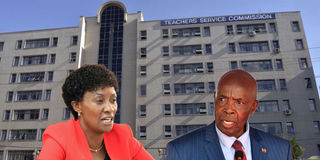TSC Act: Ministry of Education, teachers' employer on collision course

Teachers Service Commission CEO Nancy Macharia (left) and Education Cabinet Secretary Ezekiel Machogu. TSC Act, if enacted, would make the commission one of the most powerful constitutional bodies.
What you need to know:
- TSC employs and deploys all teachers but they are not accountable to the ministry which owns and finances the schools.
- There about 364,000 teachers employed by the commission and an almost equal number registered, but jobless.
A process to amend the Teachers Service Commission Act is turning out to be a supremacy battle between the commission and the Ministry of Education.
The teachers’ employer (TSC) — an independent commission — has been engaged in a silent war with the ministry under which it belonged before the promulgation of the 2010 Constitution that entrenched its autonomy.
The commission has now called for public participation on the TSC Act Amendment Bill, 2024, that, if enacted, would see the commission become one of the most powerful constitutional bodies.
The conflict between ministry and the commission stems from the fact that the TSC employs and deploys all teachers that manage basic education institutions but they are not accountable to the ministry which is the owner and financier of the schools.
Also Read: TSC rejects proposals on education reforms
The TSC has a substantial budget that it gets directly from the Exchequer. This conflict was observed by the Presidential Working Party on Education Reforms (PWPER) in its report that proposed the whittling down of some of the powers the commission wields.
For instance, whereas the PWPER report recommended the deletion of Section 35 (2) of the TSC Act, declaring it unconstitutional, the proposed bill proposes its amendment to comply with the law.
“It should be deleted together with the related provisions in the TSC regulations. Pre-service and in service teacher training is the responsibility of the Ministry of Education”, the report states.
Instead, the proposed Bill reads: “The Commission shall — (a) require every registered teacher to undertake continuous professional development programmes (b) require every registered teacher to take out a practicing certificate”.
There about 364,000 teachers employed by the commission and an almost equal number registered, but jobless.

Teachers Service Commission CEO Nancy Macharia fields questions from members of the Senate Committee on Education in Nairobi on Thursday, November 30.
“A teacher who fails to undertake prescribed continuous professional development programmes or take out a practising certificate under section 35(2)(b) of this Act, is prohibited from teaching,” warned the TSC in its proposal.
The commission says the initiative to amend the Act is meant to align it with the relevant national policy and legislative changes that have taken place since its enactment 12 years ago.
Stakeholders and members of the public are required to submit written memoranda on the proposed amendments by February 15.
The amendments appear to be in conflict with the recommendations of the Presidential Working Party that appeared to favour the ministry.
The report proposed that the TSC employs and deploys head teachers and principals in basic education institutions as agents of the ministry in the management of the institutions and thus accountable to the ministry as accounting and authorised officers — borrowing from the Public Service Commission framework. The Bill does not mention such a change.
On Performance Management and Capacity Building, the TSC said it will develop and maintain a transparent performance appraisal system for the public teaching service.
The Teachers Service Commission (Amendment) Bill, 2024 will further develop and implement a performance appraisal framework for all teachers in the public service.
The commission wants to be mandated to issue summons as may be necessary to any person or group of persons to fulfil its mandate and administer oaths or affirmations as may be prescribed by regulations.

Education Cabinet Secretary Ezekiel Machogu fields questions from members of the Senate at Parliament Buildings in Nairobi on August 9, 2023.
“The commission will establish, designate and appoint institutions for capacity building and the professional development of its employees, inform itself in such manner as it considers appropriate and exercise any power for the better performance of its mandate, review any of its decisions on its own motion and regulate its own practice and procedure,” said TSC.
The commission wants to have powers to create within itself such directorates, divisions or sections for the proper discharge of its mandate and appoint staff.
On the decentralisation of the functions of the commission, TSC shall pursuant to Article 6(3) of the Constitution ensure reasonable access of its services in all parts of the country.
On registration and compliance, the commission shall, in accordance with Article 237(3) of the Constitution, Teachers Service Commission (Amendment) Bill, 2024 set and review the standards of education and training of persons entering the teaching service.
On the qualifications for registration of teachers, the TSC said that a person shall be eligible to be registered as a teacher if they meet the qualifications set out in the Fourth Schedule and other requirements as shall be provided in the regulations or possesses any other qualifications which are acceptable to and recognised by the Commission.
The TSC may review the qualifications for registration from time to time.
TSC also seeks to publish in the Kenya gazette annually the names of newly registered teachers under this Act and any teacher reinstated to the register pursuant to section the Act.
A teacher may be removed from the register if he or she engages in immoral behaviour with or towards a learner which may include, but is not limited to sexual intercourse, sodomy, lesbianism, sexual harassment, sexual exploitation, and flirtation.
Other cases are obtaining registration through fraudulent means, being convicted of sexual offences or any other offence against a learner or minor, conviction in a criminal offence that renders the person unfit to be a teacher, forgery, impersonation and presenting forged documents to the commission, among others.
On promotion of teachers, the TSC will develop and implement appropriate staffing norms and strategies to ensure that the teacher resource is optimally utilised.
Concerning discipline, the TSC said teachers employed by the commission under this Act shall be subject to the terms and conditions of service put in place by the commission.
On the other hand, a teacher who has been interdicted shall be entitled to half basic salary and the applicable allowances, except in the case of desertion of duty.
“Where a teacher, having been subject to a disciplinary process is found not culpable, the commission will revoke the interdiction,” the TSC proposed.
The commission lists professional misconduct as negligence of duty, chronic lateness and absenteeism, desertion, incitement, insubordination and poor performance.




